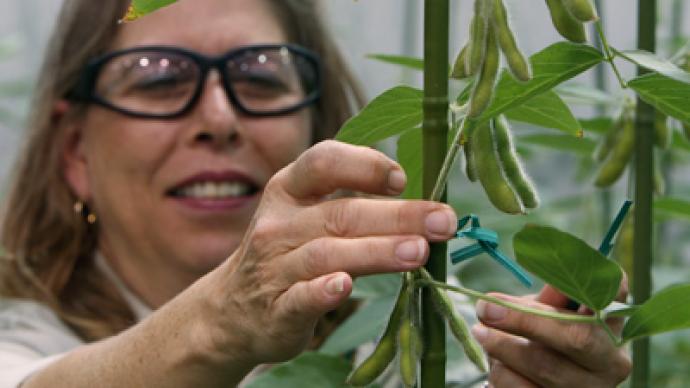Congress sides with Monsanto over GMO battle

Biotech giants Monsanto were awarded a victory by lawmakers in Washington this week after a congressional panel voted to let farmers plant genetically modified crops made by the agriculture company despite pending legal proceedings.
A committee made up of members of the US House of Representatives agreed on Tuesday this week to allow genetically modified crops manufactured by the Monsanto corporation and other biotech companies, including competitors Dupont Co., to continue to be used on American farmlands. The ruling comes despite a trove of legal challenges that have hindered full-fledged approval of some genetically modified organisms, or GMOs. Although the USDA has previously authorized Monsanto-created biocrops to be planted, an array of legal appeals have left the major agriculture company combating with opponents as of late. Questions over the safety of the lab-made crops on human health and the environment, as well as opposition from small time farmers constantly being fought by Monsanto, has slowed the federal agency from fully approving some crops. Now after the latest vote, Monsanto and its competitors will be able to offer seeds even as the Justice Department determines the legitimacy of the appeals.Nine major agricultural associations asking for Congress to let the biocrops be planted sent a letter to Washington this week, saying that opponents of the industry giants were purposely hindering the approval process.“Opponents of agricultural biotechnology have repeatedly filed suits against USDA on procedural grounds in order to disrupt the regulatory process and undermine the science-based regulation of such products,” the letter reads. “These lawsuits have also created tremendous resource constraints for USDA and have resulted in significant delays in approval of new, innovative products that will help growers provide Americans with an abundant and economical food supply while remaining competitive in the world market.”The groups behind the letter, which includes the American Soybean Association (ASA) among others, had urged Congress to support a provision in the Fiscal Year 2013 Appropriations bill that would let growers use biotech crops that have already been approved by USDA even if appeals are still being heard and further litigation is all but certain.“The inclusion of Section 733 is a positive step to ensure that US farmers and our food chain are shielded from supply disruptions caused by litigation over procedural issues unrelated to sound science or the safety of biotech crops. This legislative solution ensures that national agricultural policy is not being decided by the court system while providing a level of certainty that is critical to ensure that our agricultural producers continue to lead the world,” they write. Responding to the bill, long-time opponents of the biotech company The Center for Food Safety call the legislation a"Monsanto profit assurance provision." Monsanto has garnered their fair share of opponents as of late, a result that many will argue comes from the company’s heated stance against small-time farmers. The corporation has threatened lesser farms with hundreds of lawsuits for using genetically modified crops patented by Monsanto that have been carried onto their farms by wind and other elements of nature. Recently, the corporation threatened to sue the entire state of Vermont because lawmakers there were considering a bill that would force manufacturers to label products that are created either partially or in full from a GMO.















